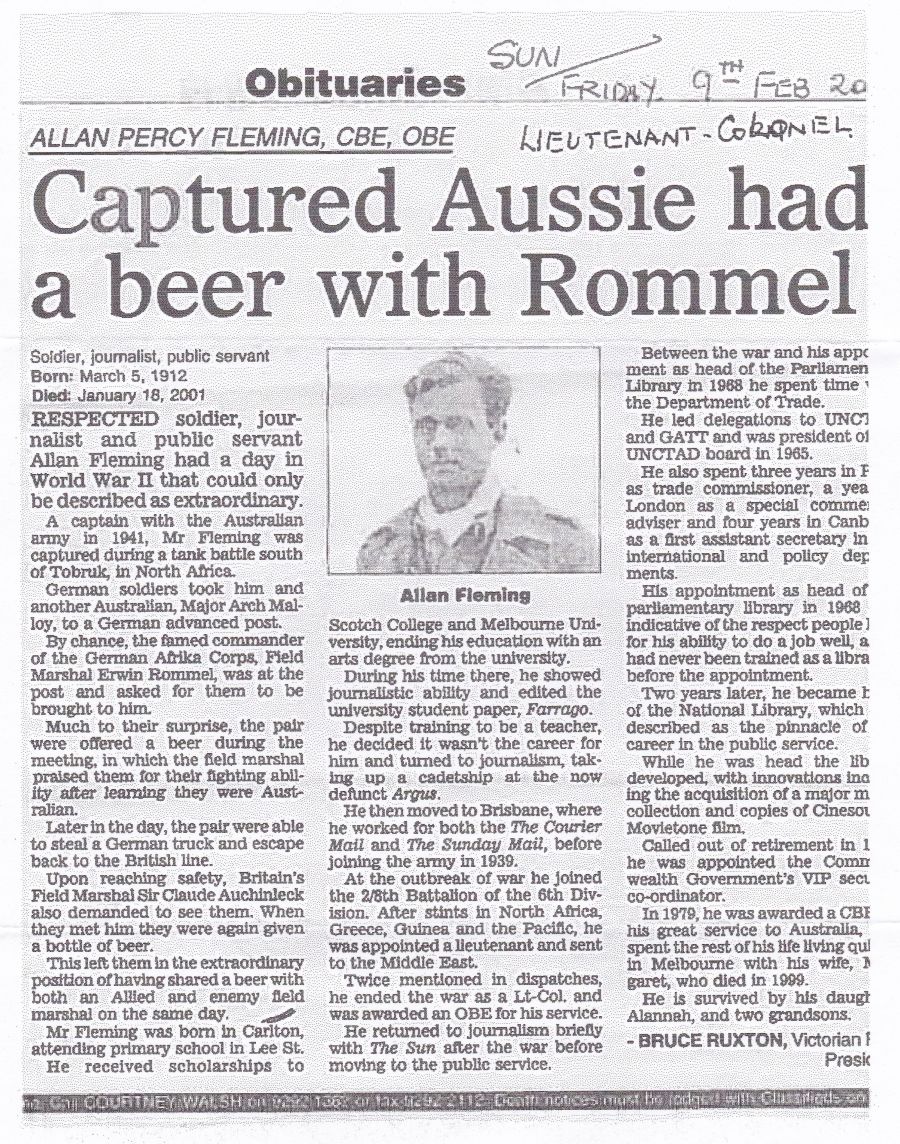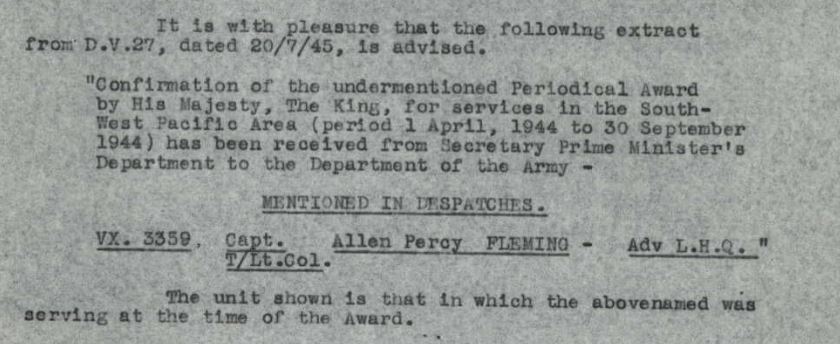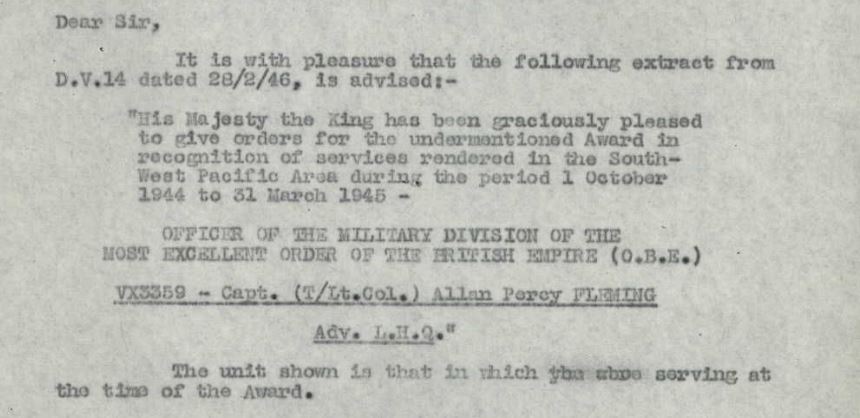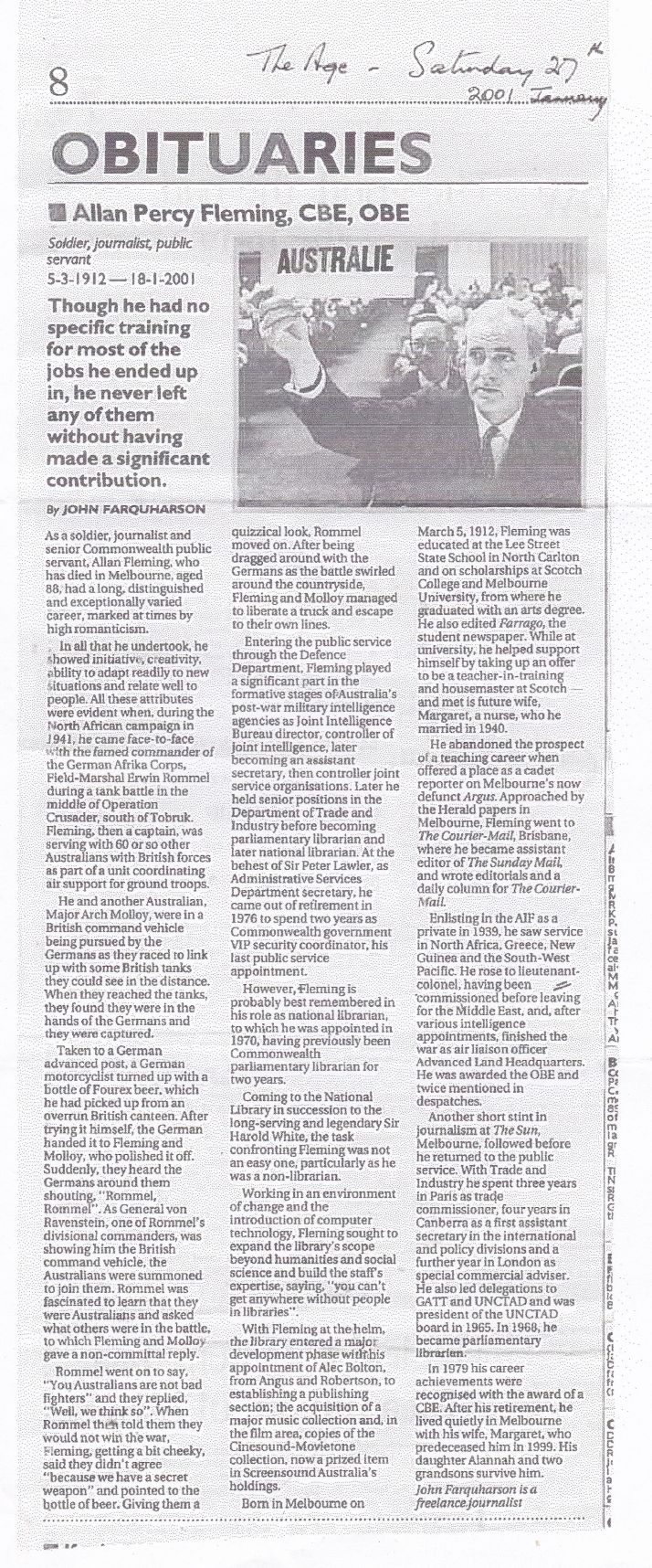When it was announced in September 1939 that Australia was once again at war, my mother’s cousin, Allan Percy FLEMING, like his father in WW1, was eager to enlist immediately. At that time, he was a journalist for the Brisbane Courier Mail and being a key member of the senior editorial staff, it took some time to organize a replacement and clear his work commitments.
In late October, along with two Irish pals, Allan went to the recruiting office at the Brisbane town hall. His Irish mates were taken straight in but because Allan was already commissioned as a Lieutenant in the Cadet Corps he was told he would have to wait until someone called him up. Not to be beaten, Allan flew back to Melbourne and without any mention of his commission, enlisted on the 3rd of November, into the 5th Battalion, the same unit as his father had served in, renamed as the 2/5th Battalion.
On enlistment, his next of kin was recorded as Albert Henry Percy FLEMING of 22 Beauchamp Street, Preston. Allan’s war service saw him rise from the rank of Private to Lieutenant-Colonel, decorated, wounded twice, captured, escaped, mentioned in despatches and awarded a military OBE.
Allan did his training at Puckapunyal military camp in Central Victoria. To his annoyance, he was placed on the switchboard instead of being handed a rifle for training. After messing up the connections of a few phone calls such as putting a Brigadier through to a butcher and General Blamey through to the cook he accomplished his mission to be kicked out of brigade headquarters and back to his unit, the 2/5th Battalion.
On the 23rd of November that same year Allan was given his first promotion to Corporal. His officers must have noticed his abilities as after being transferred to 2/8th Battalion’s 17th Brigade,* on the 28th of December he was promoted to Sergeant and on the same day was commissioned as a Lieutenant. On the 14th of April 1940, the 17th Brigade embarked for the Middle East at Port Melbourne on the troopship Dunera, arriving on the 18th of May at El Kantara, Egypt. *(The battalion was originally formed as part of the 17th Brigade of the 6th Australian Division, but in February it was decided to reorganise Australian infantry brigades along British lines, with three battalions instead of four. This meant the 2/8th was eventually transferred to the 19th Brigade but remained part of the 6th Division.)
To greet him as he disembarked at Port Said was his fiance, Margaret Elsie MORELL nee PATTERSON. Margaret’s divorce from Scott Morell had just been finalized and in a courageous act and against many obstacles, she and her friend Edna Harwood traveled to Egypt to meet Allan’s ship.
After quite a few further obstacles, Allan and Margaret were married at Tel Aviv on the 19th of June 1940 in the first AIF Middle East wedding of World War 2.
Margaret was now listed as his next of kin and her address given as C/- The Ritz Hotel, Hayarkon St Tel Aviv. Later address was recorded as 82 Burke Road, East Malvern, Victoria.
Over the next weeks, Allan’s battalion moved from Tel Aviv to Qastina and on to the Gaza Strip. During this Libyan Campaign, Allan was transferred from his platoon to be appointed Battalion Intelligence Officer because of his navigational experience learned in the Scouts. It didn’t involve the usual intelligence work as such, but it was dangerous work gathering information of specifics about the enemy’s position. The Battalion moved on through battles at Bardia, Tobruk, where they suffered heavy casualties and on to Benghazi on the 6th of February 1941. The Italians surrendered the next day.
By early April 1941 they were in Greece trying in vain to stop the German invasion. A fierce battle was fought at Vevi in the North under appalling conditions, but the German force was too strong and retreat was ordered. Major Vasey later claimed that a large percentage of the 2/8th battalion had thrown away their weapons during the retreat.
Even into his old age, Allan Fleming was angry about this and continued to campaign to clear his battalion’s name from the slur in Vasey’s war diary about their retreat from Vevi. Fleming gave his opinion in an oral history interview to Hank Nelson in 1990 for the Australian War Memorial and official war historian Gavin Long states that Vasey’s harsh statement was not all true.
Long wrote about how Allan had remained behind after his brigade had left to gather ‘stragglers’ who were lost and so scattered around the area that they would have had no idea where the rest of their battalion was. He was at the front line directing and making sure the retreating troops knew what to do and how to get out. A commanding officer spotted him and asked what he was doing, saying “We have to get the hell out of here, we’ll all be killed if we stay!” When told that Allan was staying to direct the boys the Officer said he wasn’t going to stay and left.
On the 18th of April, Allan was injured in a bomb blast but made light of it and returned to duty within a few days.
In November 1941 Allan Fleming and Arch Molloy were taken prisoner by the Germans and met with Rommel. An account was given in his obituary in 2001.
From mid-1942 Allan ceased to be seconded to the 2/8th Battalion and was transferred to Air support control where he spent ten months as an instructor to train a small band of Australians to be air liaison officers.
Mid 1943 saw him promoted to Lieutenant-Colonel and he returned to active duty in command of New Guinea Force Air Liaison Group at Port Moresby with whom he flew many missions.
By June 1944, Allan had relinquished command of this Air Liaison Group and was appointed GSO 1 (Air) Advanced Echelon, Land Headquarters in Melbourne where he was directly responsible to Lieutenant-General Frank Berryman. In 1945 he was “Mentioned in Despatches”.
The fourteenth of January 1946 saw Allan Fleming granted an honorable discharge from the A.I.F and his distinguished service was recognized a few weeks with the Order of the British Empire (Military).
In October of that year Allan was made an accredited war correspondent for the Herald Newspaper in Melbourne. He was sent to Tokyo to cover the war crimes tribunal. His later commissions included reorganising Australia’s defence intelligence, trade commissioner in Paris, representing Australia in international trade negotiation and next, the greatest switch of all, to Commonwealth parliamentary librarian and, most controversially, to National Librarian.
After he retired Allan was back at work setting up Australia’s first counter-terrorist organisation.
Author Peter Golding, in his book “An Unqualified Success: The Extraordinary Life of Allan Percy Fleming” gives a wonderfully detailed account of Allan’s war service and his life.







A fascinating and well researched tale.Congratulations Kerryn
ReplyDeleteThank you Jill. He is certainly a fascinating man.
Delete